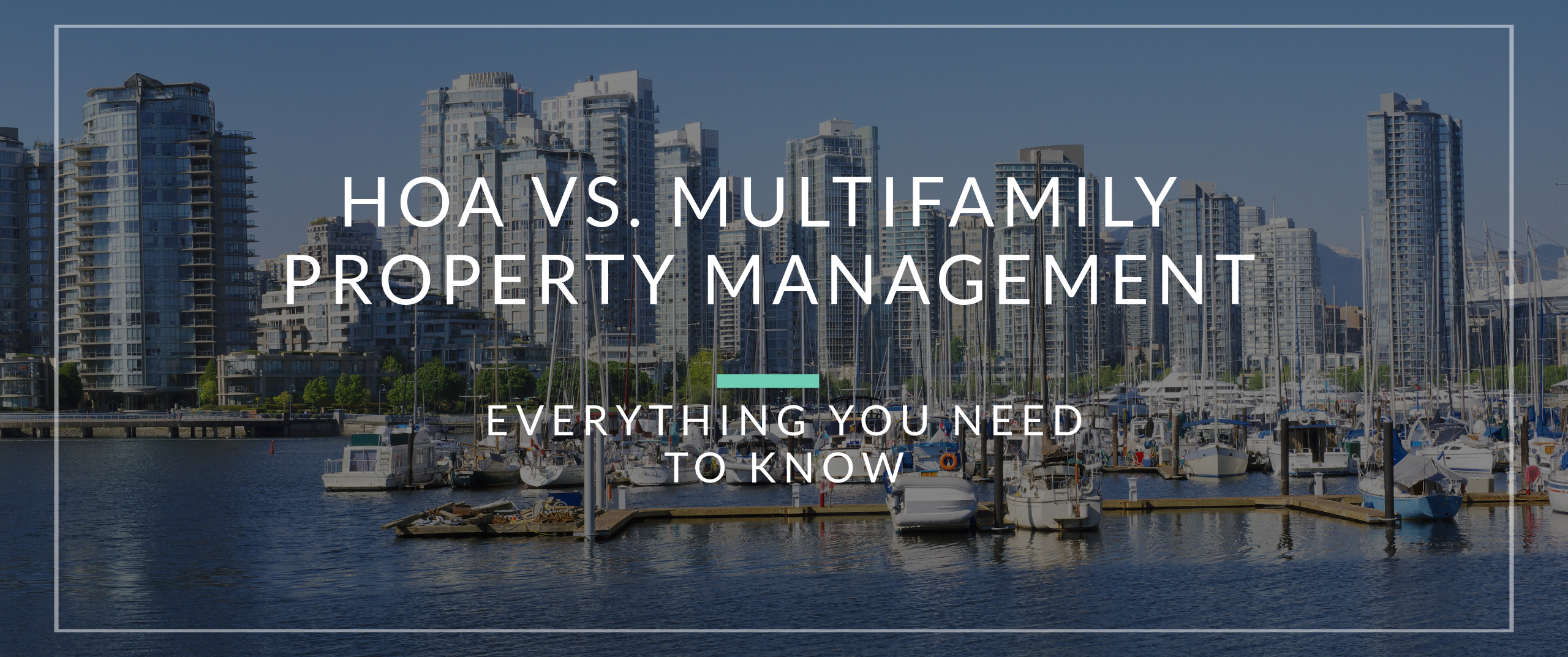HOA vs Multifamily Property Management: A Complete Guide of the Differences
It's easy to confuse multifamily property management with HOA property management. While both include the oversight of residential areas, HOA management and multifamily property management need quite different knowledge bases, skillsets, and abilities.
Read on to learn more about the difference between HOA property management and multifamily property management.
What is HOA Property Management?
When a developer or builder hands over the administration of a condominium complex to a Homeowners Association, whether it's brand new or pre-existing, it's called HOA Property Management. This type of HOA is not generally a collection of houses in a neighborhood, but rather a solo standing residential building with multiple homes.
What is Multifamily Property Management?
Whether brand-new or retrofitted, a condominium or apartment complex focuses on multifamily property management. In multifamily residential buildings, the developer or investor retains ownership and receives monthly rent or lease payments. To oversee the daily operations and maintenance of the building, they contract property management services.
Responsibilities
It is essential to understand the HOA board responsibilities versus property management companies. Below are the responsibilities of each.
Responsibilities of an HOA Property Management Company
Boards of homeowners' associations (HOAs) create and enforce HOA guidelines. Volunteer board members typically lack the time or expertise to handle the many responsibilities of HOA boards, prompting many to engage outside help from other firms to fill in the gaps and help advise HOA boards on the myriad responsibilities they have not just in day-to-day service of the residents of their community, but also to remain in compliance with laws, regulations, tax codes, and more.
An HOA management company guarantees that the demands of a community with an HOA are met, such as collecting dues, paying taxes, setting aside mandatory funds, and handling the upkeep of common spaces like clubhouses, swimming pools, and playgrounds. HOA property management companies are responsible for making residents feel satisfied that the community is a safe and pleasant place to live.
When a homeowner isn't following HOA regulations and standards, the HOA management company and their on-site property management team is also in charge of enforcing those policies, and can skillfully avoid awkward confrontations. Since board members are also community members, this is particularly useful for those who would rather not be the ones to enforce the rules.
The proliferation of HOAs throughout the years may be attributed to their role in maintaining order and uniformity within their communities. According to iProperty Management, one in four Americans now resides in a community governed by a homeowners association.
The management staff of a homeowners association also has the following responsibilities:
- Homeowners' dues and late fees need to be collected and managed.
- Playing the role of the HOA's accountant by handling the organization's books, budgeting, and other financial reporting needs.
- Renting maintenance workers and handling insurance for the neighborhood's shared facilities.
- Guidelines enforcement through neighborhood drives.
- Providing counsel to the board and carrying out its policies and procedures.
- Assisting homeowners with everything relating to their homeowners' association.
When it comes to the HOA's bylaws, property managers have an important role in enforcing compliance by ensuring all of the homes in their care do so as well. They are responsible for seeing various property-related issues, from routine upkeep to emergency fixes and beyond, to guaranteeing that the residence is being cared for properly.
Responsibilities of a Multifamily Property Management Company
When it comes to managing rentals or properties in communities with homeowners' associations, multifamily property management firms are the go-to experts. They are employed by a business or individual landlords wanting to lease or rent their properties to residents.
These companies often help lease and manage vacancies as well, though a key differentiator for a company like CHARLESGATE are the independent leasing and management teams. All too often, property management companies hire their managers at an entry-level role selling and leasing units in the building. This is ineffective, as the best and most efficient sales and retention strategies are employed by experienced agents. Further, being a sales or rental agent is a completely different career track than property management, which means you not only have someone inexperienced in the job, but likely someone disinterested in what they're doing at work every day.
At CHARLESGATE, we focus and train our leasing and sales agents on a completely separate career track than our property managers to ensure that each person working on your property is a well-rounded expert in their discipline.
Multifamily property managers share many of the same day-to-day responsibilities, but similar to focusing on sales versus management, it's critical to have managers who focus in certain types of management as well, as HOAs are a much different formal structure given the nature of their residents (permanent home owners) versus their multifamily (annual tenants) counterparts.
HOA VS. PROPERTY MANAGEMENT KEY DIFFERENCES
While both HOA home management businesses and property management firms may benefit community members, there are significant distinctions between the two. The following are some of the major differences.
1. Reputation
Although it may be simpler to create and track the reputation of a major HOA management business, a developing property manager still has to have sufficient referrals and a high industry reputation for being successful.
2. Governance
Property managers often represent individuals, whereas HOA management companies represent neighborhood HOAs governed by a volunteer board of directors.
Another key contrast is that HOA management companies often employ a team of professionals to work together, whereas solo independent property managers typically operate alone.
3. Maintenance of Amenities
While it is common for HOA management companies to be responsible for the upkeep of common areas and facilities, this is not always the case. Residents should inquire about the property manager's procedure for handling maintenance concerns before they arise.
At CHARLESGATE, customers get an end-to-end, inclusive real estate services offering. That includes things like maintenance and snow removal, conveniently all under one roof. Simplifying real estate services is the name of our game.
4. Experience
Understanding HOA self-management vs utilizing property management services involves understanding the level of experience. You should make sure your prospective property management company can handle your day-to-day needs by asking about the number of properties they have previously handled simultaneously.
Boston's Premier Property Management Company
Identifying the primary distinctions between HOA management and multifamily property management is essential for making an informed decision on the HOA management vs multifamily property management debate.
If you're looking for a property management firm in Boston that will provide you with the best service and increase your home's worth, look no further than CHARLESGATE. Our team collaborates with you to provide expert guidance on property matters, efficient management services, and attention to your homes' specific needs.

